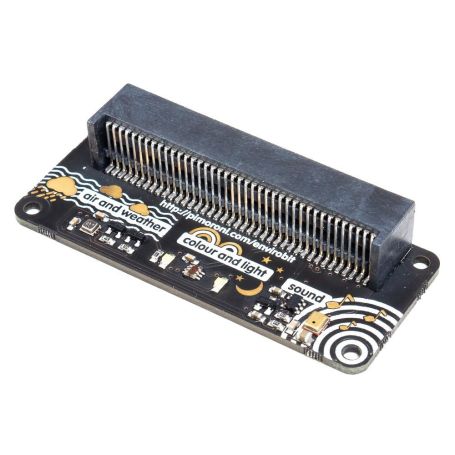Enviro:bit from Pimoroni
Environmental data capture for Micro:Bit
- BME280: Temperature, pressure, humidity
- TCS3472: light and color
- MEMS microphone
- MakeCode / block and MicroPython support
Payments are secured by LyraCollect, a French payment collection company.
It is possible to delivered to your home, to a pick-up point or picked up by appointment at MCHobby
We prepare, pack and ship your orders with great respect and care.
Enviro:bit, THE environmental sensor for Micro:Bit
Once connected to the Micro:bit, this expansion board can take a wide variety of environmental measurements by covering air, climatic conditions, light, color detection as well as sound.
All you have to do is to connect the Enviro:bit on the Micro:bit then use MakeCode (Code block) or MicroPython with Mu Editor and you are ready to capture data.
Once the Enviro:bit is connected, the Micro:bit allows you to display information on its matrix display and to interact with your project program.
It is also possible to use the Micro:bit's Bluetooth module to send data to another Micro:bit then acting as receiver and display.
Technical details
- Comes fully-assembled and ready to use
- BME280 temperature, pressure, and humidity sensor
- TCS3472 light and colour sensor
- MEMS microphone
- Compatible with micro:bit
- Microsoft MakeCode and MicroPython support
- No soldering required!
Tutorials
VYou can use the Enviro:bit with the MakeCode block editor which provides quick access to reads data from the Enviro:bit. If you want to explore more of the possibilities of Enviro: bit, we suggest you use programming in MicroPython with the Mu Editor.
To add the Enviro:bit blocks, click on the top right icon in MakeCode then "add package", then search for the "envirobit" package.
To use the blocks, you can follow the instructions as described in the library's Github repository.
The Enviro:bit MicroPython library is available in this repository which also contains instructions and examples of use.








